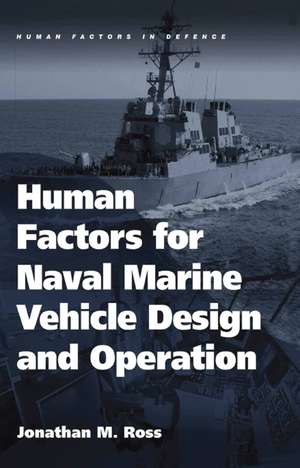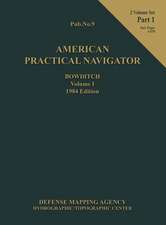Human Factors for Naval Marine Vehicle Design and Operation: Human Factors in Defence
Autor Jonathan M. Rossen Limba Engleză Hardback – 28 ian 2009
Din seria Human Factors in Defence
- 8%
 Preț: 383.57 lei
Preț: 383.57 lei -
 Preț: 487.75 lei
Preț: 487.75 lei -
 Preț: 487.02 lei
Preț: 487.02 lei - 22%
 Preț: 324.16 lei
Preț: 324.16 lei - 15%
 Preț: 427.16 lei
Preț: 427.16 lei - 22%
 Preț: 340.62 lei
Preț: 340.62 lei - 15%
 Preț: 427.16 lei
Preț: 427.16 lei - 18%
 Preț: 1115.51 lei
Preț: 1115.51 lei -
 Preț: 489.00 lei
Preț: 489.00 lei - 15%
 Preț: 461.03 lei
Preț: 461.03 lei - 15%
 Preț: 568.28 lei
Preț: 568.28 lei - 18%
 Preț: 1108.56 lei
Preț: 1108.56 lei - 15%
 Preț: 422.76 lei
Preț: 422.76 lei - 15%
 Preț: 429.62 lei
Preț: 429.62 lei - 15%
 Preț: 427.16 lei
Preț: 427.16 lei - 26%
 Preț: 456.63 lei
Preț: 456.63 lei
Preț: 1114.08 lei
Preț vechi: 1358.64 lei
-18% Nou
Puncte Express: 1671
Preț estimativ în valută:
213.17€ • 222.57$ • 176.43£
213.17€ • 222.57$ • 176.43£
Carte tipărită la comandă
Livrare economică 05-19 aprilie
Preluare comenzi: 021 569.72.76
Specificații
ISBN-13: 9780754676256
ISBN-10: 0754676250
Pagini: 244
Ilustrații: 56
Dimensiuni: 156 x 234 x 14 mm
Greutate: 0.59 kg
Ediția:1
Editura: CRC Press
Colecția CRC Press
Seria Human Factors in Defence
Locul publicării:United Kingdom
ISBN-10: 0754676250
Pagini: 244
Ilustrații: 56
Dimensiuni: 156 x 234 x 14 mm
Greutate: 0.59 kg
Ediția:1
Editura: CRC Press
Colecția CRC Press
Seria Human Factors in Defence
Locul publicării:United Kingdom
Cuprins
Contents: Foreword; Preface; Introduction; Marine vehicle types; Marine vehicles by function; Marine vehicle limitations and solutions; Symptomatic areas of concern; Human stressors; Human-machine interface; Human factors enhancement; Design considerations; Future trends; Appendices; References; Index.
Notă biografică
Jonathan M. Ross is Manager of Proteus Engineering Department of Alion Science and Technology, where he provides consultancy services, mainly to naval customers. He holds an MSE in Naval Architecture and Marine Engineering from the University of Michigan and is a registered Professional Engineer (US) as well as a Chartered Engineer (UK). He gained operational naval experience in the Atlantic and Pacific Oceans on a submarine, bathyscaphe and nuclear submarine tender. He has written and presented more than thirty technical papers in the US and internationally on human factors, computer-aided ship design, the environmentally sound warship, condition-based maintenance, and cost estimation.
Recenzii
'This is a great book. Why? Because ... it addresses the cause of many design and operational failures; ... it fills a gap, being the first to cover broadly the issue of human factors for ships; ... it is well written, explaining complex, diverse disciplines in a highly readable way. The author is to be congratulated for the publication of this book.' Volker Bertram, Germanischer Lloyd AG, Germany 'This book fills a niche and belongs as a reference in every naval architect's library, and it probably belongs on the desk of every human factor specialist working in the maritime business as well. While there are many books on naval architecture and ship design and just as many on human factors, this is quite likely the only book of its kind that speaks to the naval architect or marine engineer about human factors and to the human factor specialist about the elements of ship design.' Marine Technology, July 2009 'In naval operations, as in all forms of transportation, human error is cited approximately 80% of the time as the cause or contributing factor in accidents and incidents. A human-centered design approach to naval architecture and marine engineering is essential to improve human performance and safety in marine operations. This book is an excellent step in that direction. In this era of reduced crew size and increased automation, the role of human operators is changing to one of supervisory control. Humans are not inherently good at tasks requiring vigilance and supervisory control. Mr. Ross identifies many human factors issues that will help the naval architect and marine engineer to design marine vehicles that are more effective, efficient, and safer. This book would be an excellent textbook for students of ship design and maritime operations. It bridges the longstanding gap between two disciplines - naval architecture and human factors. Since World War II, the primary focus for human factors has been in aviation. A book like this one is long overdue.
'Human Factors for Naval Marine Vehicle Design and Operation offers an excellent discussion of the importance and process of incorporating human factors into ship design from an application-oriented perspective. The book, suitable for a wide audience, discusses issues relevant to the acquisitions community, operators and maintainers.' Ergonomics in Design, Fall 2010
'Human Factors for Naval Marine Vehicle Design and Operation offers an excellent discussion of the importance and process of incorporating human factors into ship design from an application-oriented perspective. The book, suitable for a wide audience, discusses issues relevant to the acquisitions community, operators and maintainers.' Ergonomics in Design, Fall 2010
Descriere
There is a driving need for naval professionals to focus on human factors issues. The number of maritime accidents is increasing and the chief cause is human error, both by the designer and the operator. Up to now, there has been no overarching resource available to naval marine vehicle designers and human factors professionals which bridges the gap between the human and the machine in this context. This book integrates knowledge from numerous sources as well as the advice of a panel of eight recognized experts in the fields of related research, development and operation. The result is a reference that bridges the communications gap, and stands to help enhance the design and operation of all naval marine vehicles.










